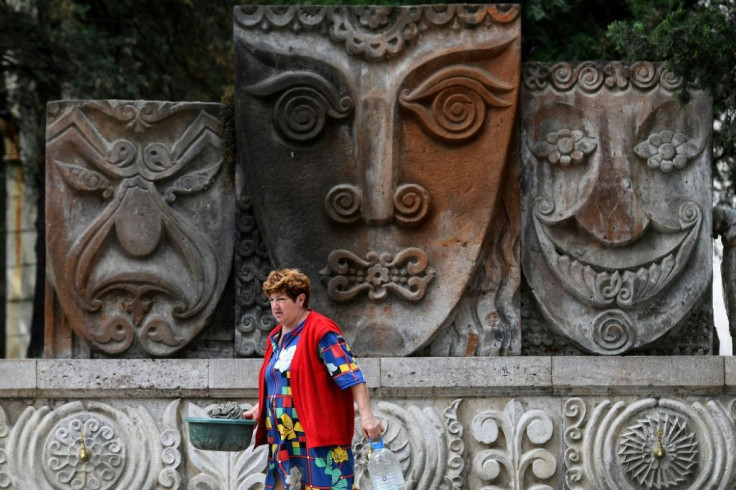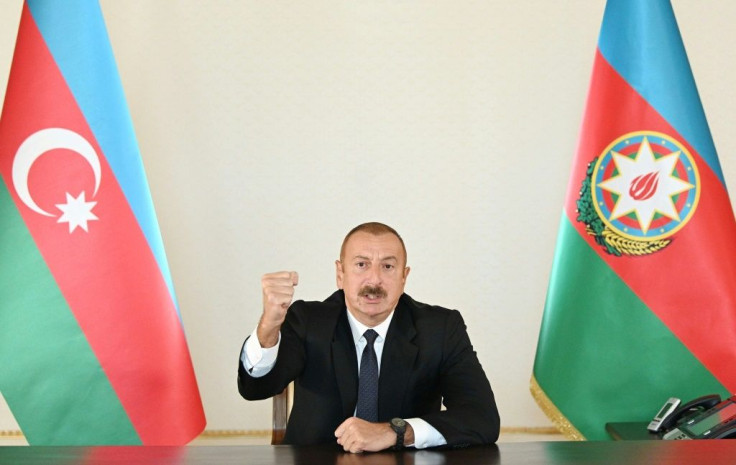Shadow Of History Makes Karabakh Solution Elusive
When Azerbaijani President Ilham Aliyev and Armenian Prime Minister Nikol Pashinyan shared a platform in a rare encounter at February's Munich Security Conference, they were both asked to give a historical overview of Nagorno-Karabakh.
It did not end well.
"In order to talk about how to resolve the conflict first we need to go back and look at the issue of history," declared Aliyev, arguing it is "historical truth" that Nagorno-Karabakh is part of Azerbaijan.

"I would ask President Aliyev not to go too far into history," retorted Pashinyan, asserting that the region only became part of Azerbaijan due to a decision taken in the early years of the Soviet Union.
The testy English-language exchange provided a stark illustration over how radically different views of history impede the search for a solution in the most intractable conflict left by the collapse of the Soviet Union.
Two weeks into the fiercest fighting over Nagorno-Karabakh since a 1990s war prompted when the region declared unilateral independence, analysts say the historical burden prevents Armenia and Azerbaijan reaching a long-term agreement, with fighting only halted by short-lived ceasefires.
For Azerbaijan, Nagorno-Karabakh is an integral part of the Azerbaijani state and is recognised as such by the UN. It has a centuries-old record of Muslim settlement by Persians and Seljuk Turks.

But Armenians argue that Nagorno-Karabakh -- which became part of the Russian Empire at the start of the 19th century -- only ended up within Soviet Azerbaijan as the Nagorno-Karabakh Autonomous Oblast (NKAO) due to a whim.
At their discussion in Munich, Pashinyan said that the decision to include the territory within Azerbaijan in the early 1920s was due to the "personal initiative" of Joseph Stalin, then Soviet commissar for nationalities.
Needless to say, the assertion was hotly disputed by Aliyev.

Armenians made up the majority in Nagorno-Karabakh and the Soviet republic of Armenia repeatedly pressed to take control of the NKAO, in moves resisted by Moscow.
But as the Soviet Union began to disintegrate, a breakaway republic was declared and war broke out.
The Armenians emerged victorious with a ceasefire finally agreed.

With hundreds of thousands of Azerbaijanis displaced from Karabakh and seven surrounding regions in Azerbaijan occupied by Armenian forces, the population of Karabakh is now almost entirely Armenian.
But Nagorno-Karabakh has never had its independence recognised by any other state, including Armenia itself.
"The positions of Armenia and Azerbaijan are so entrenched that the international community has little practical leverage over them," said Nicu Popescu, director of the Wider Europe programme at the European Council on Foreign Relations.
He said the most likely scenario was not an end to the cycle of conflict or an outright military victory but more wars in the future for "salami-slicing" of territory.
Both sides have doubled down on their positions since the meeting in Munich.
"We have to go back there (Karabakh)," said Aliyev at the weekend, describing it as "our land".
On a visit to Karabakh in August, Pashinyan had even called for unification with Armenia, declaring "Artsakh (Karabakh) is Armenia, and that's it."
Both sides also deploy a selective view of history, focusing on atrocities committed by the other side while overlooking their own.
Armenians remember the pogroms in Sumgait in Azerbaijan when mobs went on the rampage in February 1988, leaving at least 26 Armenians dead.
But in Khojaly in 1992, Armenians fired on fleeing civilians in a massacre that Azerbaijan says left hundreds dead.
Since a ceasefire ended the latest flare-up in fighting in 2016, "the peace process has ground to a virtual halt with a corresponding rise in angry rhetoric," said analysts at the International Crisis Group.
The role in the region of Turkey, Azerbaijan's chief ally, poses another problem as Armenians despise the modern Turkish state for its refusal to recognise the massacres of Armenians in the Ottoman Empire as genocide.
Analysts point out that where there has been less loaded interpretation of history, all hope is not lost, with Armenians and Azerbaijanis peacefully co-existing during much of the Soviet era and even today outside the Caucasus region, notably in Russia.
"Someone should perhaps reprint the text of the 1724 Persian-era friendship treaty signed between the Armenian lords of Karabakh and the Azerbaijani khans of Ganje against the Ottoman Turks," commented Tom de Waal, Senior Fellow at Carnegie Europe, after the presidents rowed in Munich.
© Copyright AFP 2024. All rights reserved.





















